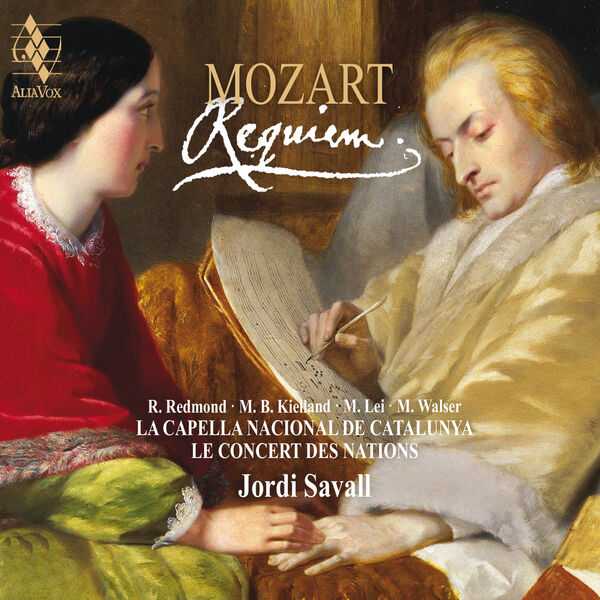

Composer: Wolfgang Amadeus Mozart
Performer: Rachel Redmond, Marianne Beate Kielland, Mingjie Lei, Manuel Walser, La Cappela Nacional de Catalunya
Orchestra: Le Concert des Nations
Conductor: Jordi Savall
Format: FLAC (tracks)
Label: Alia Vox
Catalogue: AVSA9953
Release: 2023
Size: 819 MB
Recovery: +3%
Scan: yes
Requiem in D Minor, K. 626
01. I. Introitus: Requiem aeternam
02. II. Kyrie eleison
03. III. Sequentia: No. 1, Dies irae
04. III. Sequentia: No. 2, Tuba mirum
05. III. Sequentia: No. 3, Rex tremendae
06. III. Sequentia: No. 4, Recordare
07. III. Sequentia: No. 5, Confutatis
08. III. Sequentia: No. 6, Lacrymosa
09. IV. Offertorium: No. 1, Domine Jesu
10. IV. Offertorium: No. 2, Hostias
11. V. Sanctus
12. VI. Benedictus
13. VII. Agnus Dei
14. VIII. Communio: Lux aeterna
Tradition und Vision, young and old, show and intimacy. This year’s Mozart Week in Salzburg offered the Requiem in two performances which couldn’t diverge more from each other, even though they are based on the same score. First, the 81-year-old Savall conducted with his chamber ensemble Le Concert des Nations and chorus La Capella Nacional de Catalunya a version vividly depicting the horrors of death ; 4 days later, the 30-year-old Thomas Guggeis – replacing Daniel Barenboim – delivered with an abundantly-staffed Vienna Philharmonic Orchestra and Wiener Singverein a traditional obliging reading……… Savall succeeded in delivering a much more convincing and direct performance ….. Jordi Savall had a clear advantage regarding the concert location and the ensemble. And while traditional conductors perform this music with Bruckner and Wagner in mind, Jordi Savall intimately knows the history preceding Mozart. It dramatically changes the perspective ….. Jordi Savall has played everything of the gambe and ensemble music from the Middle-Ages to Mozart (and recently Beethoven and Franz Schubert). Among which much religious music, that Savall colors with a Spanish Catholicism full of dark pathos and menacing death….. Savall, as a musician and consummate scholar is a man of the Enlightenment and succeeds in reviving the original religious intention and effect of this Mass for the Dead.
Hearing rumours of great artists remastering their works several years after their release is sure to put you on your toes. Once the comparison between the different recordings is over, one is tempted to see them as snapshots of an aesthetic ethos, testaments to an artistic evolution. In this case, Jordi Savall offers us a fine gift: 30 years after his first version of the Requiem, here he is, conducting Mozart’s masterpiece with an entirely new Concert des Nations. Savall’s gesture becomes all the more touching as he explains that it was motivated by a chance personal anecdote from when he was 14—his dazzling and unexpected confrontation with Mozart’s quasi-testamentary work.
In this new production, the Catalan master takes his obsession with detail and historically informed interpretation even further: from the exact Latin pronunciation employed in Vienna at the time, to the pitch 430, to the specific embouchures of the trombones. The ensemble also drew on the remarkable work of the musicologists Jean and Brigitte Massin.
This Requiem is captivating in its fluidity. The soloists sparkle—the stunning soprano Rachel Redmond and the baritone Manuel Walser in particular. The choirs of the Capella Nacional de Catalunya form a solid rock with the Concert des Nations, each group embracing the asperities of the other in a play of contrasts and chiaroscuro touching on the mystery of Mozart’s ambiguous relationship with the Christian faith. The recording culminates in the “Lacrymosa”, which quietly devastates with its balance and the sensuality of its melodic lines. This new version is among the best in that it handles the mystery of Mozart’s genius without ever distorting it.